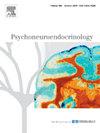睾酮和情绪表达塑造叛变-合作冲突中的社会互动
IF 3.4
2区 医学
Q2 ENDOCRINOLOGY & METABOLISM
引用次数: 0
摘要
情绪和睾丸激素等激素对包括合作在内的社会互动至关重要。然而,睾酮是否调节背叛与合作冲突中情绪表达的影响尚不明确。本研究旨在探讨单剂量睾酮对囚徒困境博弈中合作行为和情绪表达的影响。在双盲、安慰剂对照设计中,61名健康的年轻男性接受了125 mg剂量的睾酮凝胶或安慰剂,随后接受了包括情绪表达在内的改良PDG范式。睾酮在面对背叛时增加了背叛的可能性,但在双方合作时则增强了合作。值得注意的是,当接触到对方的负面情绪时,接受睾丸激素治疗的人用Emoji 4(通常表达强烈的负面情绪)的比例更高。研究结果强调了睾酮和情感线索在社会互动中的重要相互作用,并表明睾酮在社会情境中的特定作用。本文章由计算机程序翻译,如有差异,请以英文原文为准。
Testosterone and emotion expression shape social interactions in defection-cooperation conflicts
Emotions and hormones such as testosterone crucially shape social interactions, including cooperation. However, whether testosterone regulates the impact of emotional expressions in defection versus cooperation conflicts remains elusive. The present study determined the effects of single-dose testosterone administration on cooperative behavior and emotional expression in the prisoner’s dilemma game (PDG). Sixty-one healthy young males received either a 125 mg dose of testosterone gel or placebo in a double-blind, placebo-controlled design and subsequently underwent a modified PDG paradigm including emotional expressions. Testosterone increased the likelihood to defect when facing defection, yet enhanced cooperation when both players cooperated. Notably, when exposed to negative emotions from their counterparts, testosterone-treated individuals reacted with a higher proportion of Emoji 4 (commonly conveying strong negative emotions). Findings underscore the crucial interaction between testosterone and emotional cues on social interactions and indicate a social context-specific role of testosterone.
求助全文
通过发布文献求助,成功后即可免费获取论文全文。
去求助
来源期刊

Psychoneuroendocrinology
医学-精神病学
CiteScore
7.40
自引率
8.10%
发文量
268
审稿时长
66 days
期刊介绍:
Psychoneuroendocrinology publishes papers dealing with the interrelated disciplines of psychology, neurobiology, endocrinology, immunology, neurology, and psychiatry, with an emphasis on multidisciplinary studies aiming at integrating these disciplines in terms of either basic research or clinical implications. One of the main goals is to understand how a variety of psychobiological factors interact in the expression of the stress response as it relates to the development and/or maintenance of neuropsychiatric illnesses.
 求助内容:
求助内容: 应助结果提醒方式:
应助结果提醒方式:


